- Home
- Hammond Innes
Medusa Page 24
Medusa Read online
Page 24
That was when we heard the rumble of engines coming from seaward, and a moment later we saw the dim shape of a flat box of a vessel. There were two of them, old LCTs dating from the days before they called them logistic landing craft. I recognised them immediately, one of them having dropped me off at Loch Boisdale on its way to St Kilda some years back. The Santa Maria had clearly been leading them in. Now she was alongside and a man had jumped ashore. I watched him through the glasses as the men on the quay gathered round him. Even in that dim light I was certain it was Evans. He was head and shoulders taller than most of them, standing there, hands on hips, issuing orders. He wore a kepi-like forage cap and camouflage jacket and trousers, and the way he stood, the arrogance and the air of command, I was suddenly reminded of early pictures of Castro.
A splash, and the first of the logistic vessels had dropped its stern anchor, the big drum winch on the afterdeck reeling out the hawser as the ship nosed into the quay. The bow doors opened, then with a clank and a crash, the ramp dropped on to the quay. By then the second vessel was coming in alongside it and a moment later the vehicles inside the two slab-sided hulls, their engines already running, began to trundle out. They were half-tracks, each of them mounting what looked like a heavy Bofors gun, and as they came off the ramps they were joined by small detachments of the men on shore.
Behind the half-tracks came men, dozens of them, dressed in some drab uniform and loaded down with equipment, each of them pausing for a moment as they stepped on to the terra firma of the quay’s concrete edge. It was as though they needed to find their feet. Some, as they stood there, arched their backs and stretched. A babble of human voices reached up to us. It was the natural reaction of men who had been cooped up in a confined space for some considerable time and for a moment the scene below us was one of disorder, almost chaos. Then somebody shouted. I think it was Evans, and the men standing around the parked trucks began splitting up and moving to join the new arrivals, the melee gradually sorting itself out as they formed up into units and marched off to embark in the waiting trucks or climb on to the backs of the half-tracks.
It was less than ten minutes from the time the LCTs had put their ramps down to the moment when the local vehicles were all loaded and the whole convoy beginning to move off, and by then I was convinced that what we were witnessing was the start of an armed usurpation of the political power in the island. Who the men were that had landed from the two LCTs, where they had come from – that was of no importance for the moment. What was important was to alert somebody in Mahon to the danger. I saw it all in a mental flash, dissident elements, gathered from the various towns, meeting here to be given arms and then to be distributed amongst the newly arrived mercenaries, or whatever they were, to guide them to objectives that had already been decided on.
It seemed ridiculous on the face of it. There couldn’t be more than a hundred and fifty to two hundred men down there on the quay and the military garrison of the island I knew to be somewhere around 15,000. But if what Petra had told me was correct, the effect of the previous night’s violence had been a redeployment of the available forces, so that the towns, and particularly the urbanizations inhabited by foreign visitors, were fully protected. As a result, the men below me had not only the advantage of surprise – essential in an operation of this sort – but also the certainty that the island’s defences were thinly spread and the targets they would be aiming at that much more vulnerable. In such circumstances anything was possible.
All this passed through my mind in a flash as the vehicles moved out on to the steep road up from the port and Lennie and I flung ourselves back across the road and into the car. ‘Mahon,’ I told Petra. ‘Lights on and drive like hell.’
She didn’t hesitate. She had seen the ships, the mustering men. She swung out on to the Alayór road, her foot hard down and the elderly Beetle shaking and swaying at the rear. ‘Who are they?’ She was taking a bend fast, pines rushing at us. ‘What are you going to do?’ And when I said I had to get to the frigate, she started to argue, asking why I didn’t stop off somewhere and phone the nearest Guardia Civil post or Military Headquarters in Mahon.
‘For God’s sake! Who would believe me?’ I started to remind her then that I was suspected of complicity in the Martinez murder. ‘Anyway,’ I added, ‘they’ll almost certainly have cut the telephone wires.’
‘Alayór then. Alayór is nearer than Mahon.’
‘No, Mahon,’ I told her. It was Gareth I needed. He had all the means of communication there on board, the whole world at call. And then I was briefing her what to tell Soo after she had dropped us off at the Maritimo pontoon, who to telephone, very conscious that it would be the early hours of the morning, everybody asleep and in no mood to believe that danger was imminent.
‘You’ll have to come with me,’ she argued. ‘Even if I can get through to somebody in authority …’
‘No,’ I said. ‘I’ve got to make contact with Gareth.’
But the frigate was something too remote for her to grasp, and anyway she did not want the responsibility of alerting people locally. ‘You know what they are. They won’t believe a woman. I’ll never get it across to them.’ And even when I told her she was one of the few people outside of government they would believe, that as an English archaeologist she had the standing of a scientist and therefore would be regarded as a reliable witness, she went on arguing until the crossroads came up in the headlights and I put my hand on her knee and told her to turn left for Mahon or I’d switch the engine off, drive the car myself and leave her at the side of the road.
An angry silence filled the car after she had made the turn, the road snaking through a forest of pine, with the scent of resin all-pervading, then straightening out with no sign of lights anywhere. Something flapped across the beam of our headlights, a kite probably. We reached the turn-off to Faváritx, and still nothing on the road. In fact, we did not see another vehicle until we were running into the outskirts of Mahon. Where the road curved down the hill from the main Ciudadela highway we had to wait for a small convoy of three army trucks which swung into the road in front of us, then turned off to the left, almost certainly bound for the Zona Militar barracks out on La Mola.
‘Why not try the Naval Base?’ Petra said. ‘Fernando likes you. He would believe what you told him.’
I had already thought of that. It was very tempting, the Naval Base so close we were almost at the entrance to it. But how long would it take me to get through to Perez? ‘No,’ I said. ‘Gareth is a safer bet.’ I was watching the tail-lights of the convoy climbing up the hill beside the Base, the white beam of their heads shining on the heathland scrub with its pillboxes and old stone fortifications built to stand against Napoleon. Another ten minutes, maybe quarter of an hour, and other vehicles would be rolling up that road on to the long peninsula that formed the northern arm of the finest deep-water natural port in the Western Mediterranean, and at the end of that peninsula was La Mola with its barracks and casements and those huge guns. I had absolutely no doubt that this would be one of the main objectives, La Mola being little more than an island, the neck joining it to the main arm of the land so narrow it could readily be sealed with mines, the whole garrison then cut off. ‘Keep going,’ I told her. ‘I haven’t time to argue with the Navy guard at the entrance. And Perez might be in Ciudadela, anywhere.’
We passed the turning to the Base and over my left shoulder there were lights on a freighter lying alongside the new quay, and beyond it, lights flashing green on the naval jetty. Then we were under the mass of Mahon itself, hammering along the waterfront past the commercial quay. There was a ferry lying there and out beyond Bloody Island I could see the dim shape of Medusa lying broadside to the town. A minute later we had rounded Punta Maritimo and Petra was bringing the car to a halt at the pontoon. I remember telling her to say something nice to Soo for me as I flung open the door and leapt out, the black, limpid water of the harbour washing lazily at the concrete of the roadway,
the wooden boards of the pontoon moving under my feet. ‘You reck’n they’ll go for La Mola?’ Lennie asked as he cord-whipped the outboard into life and we nosed out past the mooring lines of a big French sloop, the bows lifting as he increased the revs, heading to pass just north of Bloody Island where the frigate’s bows were pointing towards Nelson’s Golden Farm.
I nodded, the noise too great for conversation.
‘They could just concentrate on the town, you know,’ he yelled in my ear. ‘Seize the town hall, take a crack at Military HQ and occupy the radio station. Wouldn’t that be enough?’
I shrugged, unable to answer him, thinking ahead to my meeting with Gareth. I could imagine him asking me just those questions and what the hell would I say? We passed the quick-flashing red beacon close to the dig, Lennie cutting it so fine I could see the wheelbarrows still full of the rubble we had been shifting, and then the businesslike outline of Medusa was looming nearer. ‘Which side?’ he shouted in my ear.
‘Starb’d,’ I said, and he swung in a tight arc, passing so close under the bows I thought he would smash into the anchor cable. The engine slowed, then died with a cough as he brought the inflatable alongside where the accommodation ladder had been lifted clear of the water. By then I had Petra’s big torch beamed on the bridge, flicking the switch on and off – three dots, three dashes, three dots – hoping that whoever was on watch would realise the SOS was to signify urgency, not just some drunk from the shore playing silly buggers. I could hear the hum of the ship’s machinery now, sense the power of the organisation that was in her. ‘Ahoy there. Medusa!’ I was shouting for the Officer of the Day, the Captain, anyone, my voice raised high, desperate with the need to be got on board quickly. A face under a sailor’s hat leaned out above me. ‘Wot you want?’
‘The Captain,’ I shouted up to him. ‘Tell the Captain it’s Mike Steele and it’s urgent. Every minute counts.’ A door slammed and a beam of light was directed straight at me, my eyes blinded, and a voice said, ‘Good evening, sir. You come to return that beard we lent you?’ It was young Davison, the officer-under-training, and he was grinning. ‘The Captain!’ I yelled at him again.
‘The Captain’s asleep, sir.’
‘Well, wake him up. And get me on board. I have information for him that must be transmitted to London immediately.’
He stood there for a moment, mouth agape, gazing down at me. I could see his brain working, trying to decide whether this was a joke or something deadly serious. Fortunately the beard was in my pocket, where it had been for some time now, otherwise he might have thought I was fooling. ‘Hurry, man! For God’s sake hurry!’
He nodded, suddenly seeming to pull himself together as he ordered a sailor to lower the ladder, then turned and ran to the bridge. He was back by the time I had scrambled up to the deck. ‘This way, sir. Captain says to take you to his cabin.’
Gareth was in his dressing gown as I was shown in, his face pale, his hair tousled. ‘Thank you, Davison. That’ll do.’ He turned to me. ‘Now, what’s this all about?’
I made it as short as possible, but before I had finished he had reached for the phone, flicking a switch. ‘Captain. Call all hands. Lieutenant Commander Mault to my cabin immediately.’ He had pulled out a notebook and was flicking through the pages. ‘Anchored out here we’re not on a land line, so we have to slot in to the telephone system through ship-to-shore. However, I can contact the Naval Base on UHF.’ He was reaching for the phone again when Davison’s voice broke in on the loudspeaker – ‘Captain, sir. This is the bridge.’ He sounded a bit nervous, very excited. There’s what sounds like shots coming from the direction of La Mola – and, sir, we’re just picking up bursts of machine-gun fire from the town now.’
‘Very good, I’ll be up.’ Gareth turned to glance at the wall clock, picking up a comb and smoothing his hair. The second hand flicked to the vertical. It was exactly 03.31. ‘From what you’ve told me, looks like the time of attack on all objectives was zero-three-thirty.’ And he added, ‘I’ve been expecting something like this.’ He slipped out of his dressing gown and began pulling on trousers and white polo-necked sweater over his pyjamas. ‘But not those logistic craft.’ He had me describe in detail the scene on the quay at Addaia. ‘You’re certain it was Pat? He was on that fishing boat of yours and led them in?’
‘Yes,’ I said. ‘And he was organising them ashore.’
‘The whole thing – I mean, the men who came ashore from those LCTs as well as the locals? You’re sure?’
‘I think so.’ It was obvious he didn’t want to believe that the man was totally involved, but when I told him it was bright starlight and I had ten-magnification glasses on him, he sighed and said, ‘I suppose I should have expected that.’ He was buttoning up his jacket. ‘Well, no good trying to alert Capitan Perez now. His boys can hear the shooting just as well as we can here. Let’s go up to the bridge.’
Outside the cabin all was bustle as the ship came to readiness, men in various stages of dress hurrying to their posts, the bridge itself beginning to fill up. As soon as we reached it, we could hear the firing out on La Mola, for they had both wing doors open. We went out on to the starb’d wing and stood there looking at the black outline of the peninsula sprawled against the stars. ‘When do you reckon first light, Pilot?’
‘With the sky as clear as this, sir, there should be a glimmer in the east within the hour.’
‘An hour’s darkness.’ Gareth nodded, then turned to me. ‘Nice timing, the whole thing highly organised.’ And he added, That will be Pat. He’s had a lot of experience – Angola chiefly, Mozambique, with the Polisario, and Wade says they thought he had done a spell with the Contras, so he’s had the benefit of American as well as South African training.’
Mault appeared at his elbow. ‘I was ordered to report to your cabin, but you weren’t there.’
‘No, I’m here.’ Gareth’s voice was sharp. ‘Have the launch brought alongside and go across to the Base. Try and see Capitan Perez personally. Offer him any assistance he needs. Oh, and tell him the entire force at the disposal of the insurgents at this moment in time is not more than two hundred. They are supported by professional troops landed from two small logistics craft at Addaia. I have an eye-witness of the landing here on board Medusa.’
Mault hesitated, glancing at me. ‘Wouldn’t it be better if I took Mr Steele with me?’
‘No.’ Gareth’s voice was even sharper. ‘Tell the Jefe he can interview him here on board if he wants to.’ And he added, ‘Now hurry, man. Things are happening, and happening fast. Perez needs to know that the whole thing can be controlled and suppressed if he acts quickly enough.’ He turned to Davison. ‘Is somebody looking after that inflatable and the man who was with Mr Steele?’
‘Yes, sir. He’s been taken to the petty officers’ mess for some coffee.’
‘Good.’ He turned back into the body of the bridge as the Yeoman of Signals appeared at his side with a piece of paper in his hand. ‘A sit-rep, sir. The Communications Office were alerting the radar unit on top of the Toro rock when the radio contact suddenly went dead, there’s a small foreign outfit in Alayor, nobody knows yet what nationality but Arab by the look of them, and there’s a ham of sorts broadcasting Independence Day messages from Ciudadela.’
Gareth glanced through the paper, nodded, dealt with the little queue of officers waiting to be briefed, then went over to the nearest mike, his voice stilling all conversation as it blared out over the ship’s main broadcast: ‘This is the Captain speaking. We have a situation ashore that was not wholly unexpected and is to some extent our reason for being here in Port Mahon …’ And then he was outlining briefly what the firing was all about. He also indicated that there had been outside intervention … ‘Whether by political sympathisers, mercenaries or some foreign power is not yet clear. I will keep you informed.’ Just as he said that there was a flash, followed immediately by the rumble of a heavy explosion, the rumbling muffled as though it were underground
, and suddenly the highest point of La Mola was lit by a pyrotechnic display that was so colourful and went on for so long it was more like fireworks than the destruction of a military target. ‘Looks like they’ve got the garrison’s ammunition dump.’ Gareth had a pair of the bridge binoculars fixed on La Mola. Davison said something to him and he lowered the glasses, frowning. ‘Funny! I should have thought he would have been glad of a coffee, even a drink …’ He turned to me. ‘That Australian of yours. Seems he was worried about something, so he’s pushed off. Said he’d be at the dig when you wanted him. Yes, Yeo?’
The Yeoman of Signals was at his elbow again. ‘Looks as though they’ve taken the radio station, sir. They’re playing local music interspersed with announcements of this sort.’ He handed Gareth a slip of paper.
‘Ismail Fuxá –’ Gareth was reading it aloud – ‘I imagine you pronounce it Fusha, the X is sh, isn’t it? He’s described here as leader of the Independent Movement and it says he’ll be broadcasting an Independence Day message to the Menorquin people at 06.00. Apparently the speech will be repeated every hour on the hour throughout the rest of the day. What do you think?’ He glanced up at me. ‘The speech taped in advance?’ And he added, ‘Must have been. Which suggests a degree of organisation …’
The Navigating Officer interrupted him. ‘Message from the Naval Base, sir. No answer from the garrison command post on La Mola. And the Jefe would like a word with you on UHF.’

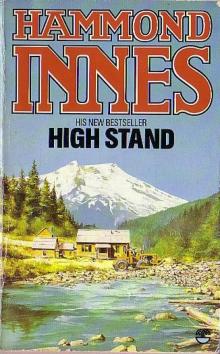 High Stand
High Stand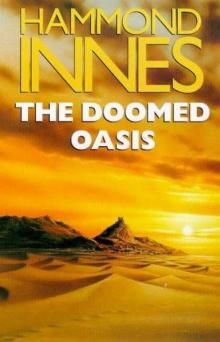 The Doomed Oasis
The Doomed Oasis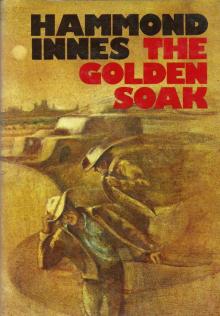 Golden Soak
Golden Soak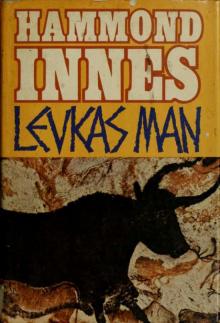 Levkas Man (Mystery)
Levkas Man (Mystery)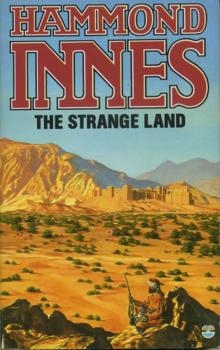 The Strange Land
The Strange Land Dead and Alive
Dead and Alive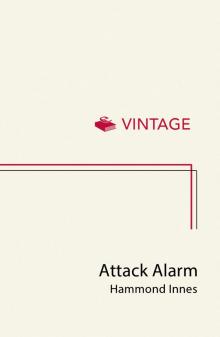 Attack Alarm
Attack Alarm The Strode Venturer
The Strode Venturer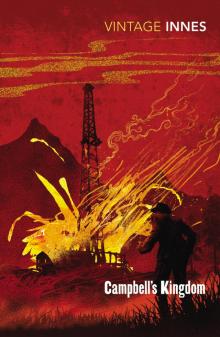 Campbell's Kingdom
Campbell's Kingdom North Star
North Star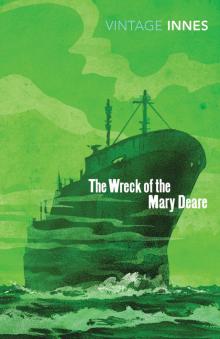 The Wreck of the Mary Deare
The Wreck of the Mary Deare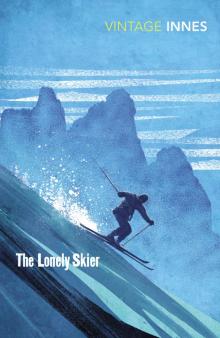 The Lonely Skier
The Lonely Skier The Black Tide
The Black Tide The Trojan Horse
The Trojan Horse Medusa
Medusa Air Bridge
Air Bridge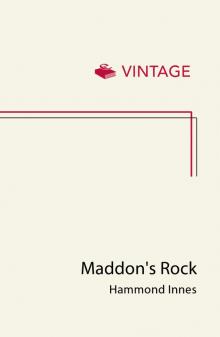 Maddon's Rock
Maddon's Rock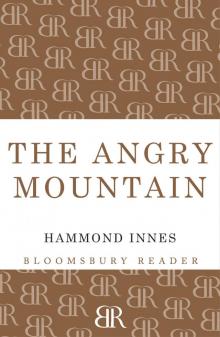 The Angry Mountain
The Angry Mountain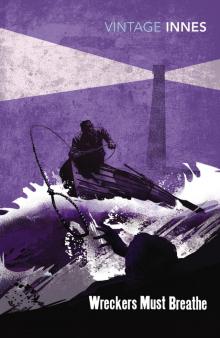 Wreckers Must Breathe
Wreckers Must Breathe Solomons Seal
Solomons Seal The White South
The White South